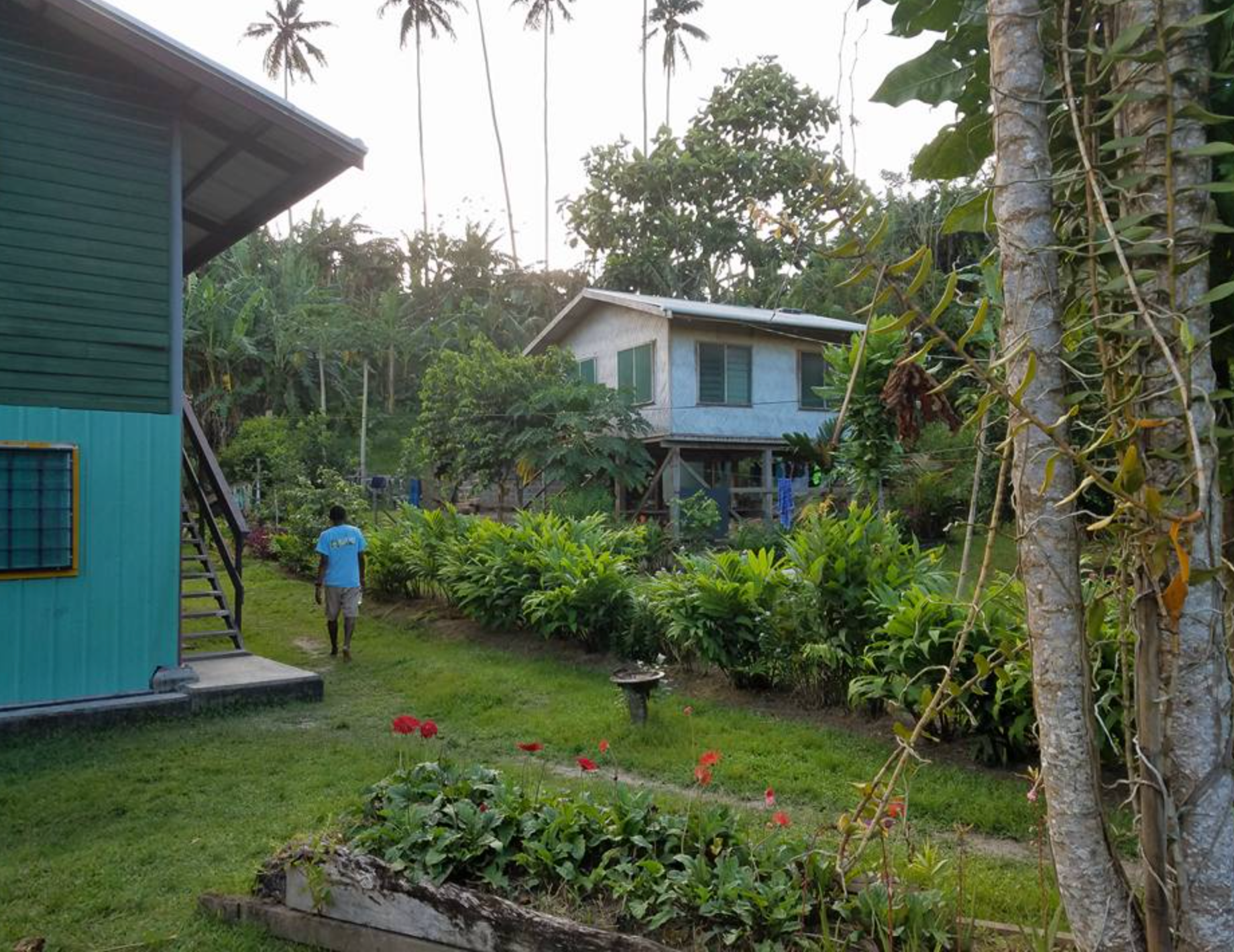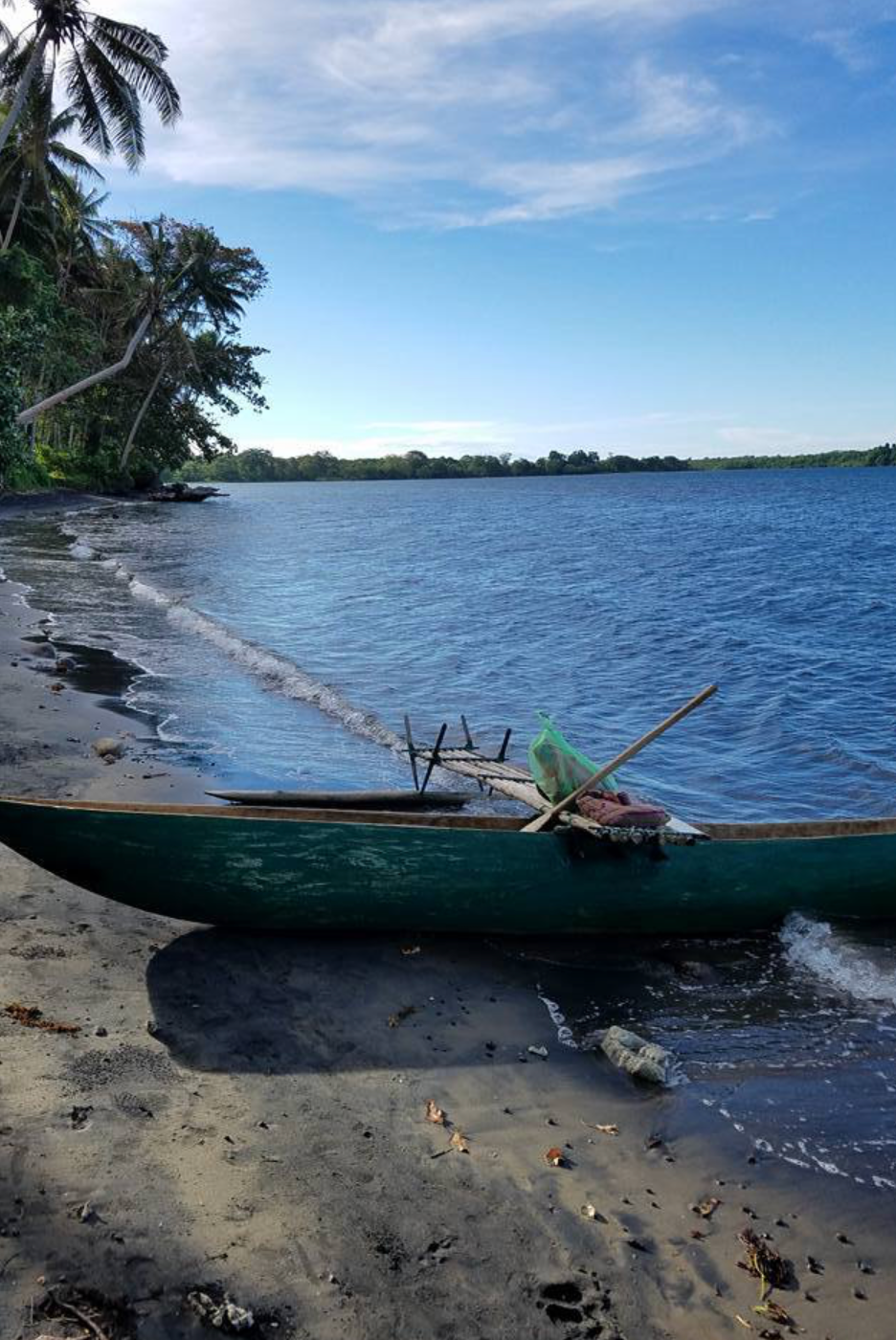
“We are crying for our land. We are crying for our land that has been destroyed. They dug out our land and the waste has been washed out to the sea. We cry for our land.” -- We Are Crying For Our Land: Stories From the Panguna Listening Project
The Carterets in Papua New Guinea is a coral atoll that is home to 3,000 people in 6 island communities living on land less than 3 meters above sea level. In the early 1990s, after several years of experiencing environmental changes, community Elders made a collective decision to relocate the Carteret Islanders to mainland Bougainville to save its people from rising seas and coastal erosion that was flooding their homes, destroying their food crops, and polluting their waters. Many people still live on the Carteret Islands today, while a few families have relocated to Tinputz, Bougainville.
Ursula Rakova, from Hans Island in the Carterets, says that the circumstances are fragile for families back on the islands. “Presently, 430 family households remain in the Carterets, which has seen a significant increase in population from the last electoral commission count,” she says. “These islanders are struggling to meet the daily needs of their families, with the hardest hit families having an average number of seven children per family. I hold fear in me about the Islanders remaining on the Carterets, because if a sudden and severe king tide happens, the whole island will disappear and there is going to be a catastrophic genocide of Islanders being washed away without any trace. A whole generation of people will be lost.”
Although separated by sea from Bougainville, the Carteret Islands are part of the political jurisdiction of the Autonomous Bougainville Government of Papua New Guinea (ABG). The ABG became autonomous in 2005 after a brutal decade-long civil war that began in 1988 when Indigenous landowners led an uprising over the mass environmental destruction caused by the Panguna copper and gold mine and inequitable distribution of the mine’s profits. Since Panguna’s inception in the 1970s, the mine generated more than $2 billion in revenue and released billions of metric tons of mining waste that seeped into the land, killing wildlife, polluting water supplies, and disrupting the lives of local communities. The government of Papua New Guinea sent police and military troops to stop the uprising and secure the mine. Neighboring villages were burnt, and villagers were forced into military-run detention camps where torture, rape, and extra-judicial killings were recorded. Almost 15,000 lives were lost during the war.

A typical model of homes in Woroav, Tinputz, Bougainville, where 10 families have been relocated. Photo by Salote Soqo/UUSC.
Panguna was owned by the British-Australian mining giant Rio Tinto, which abandoned the mine in 1999 and has since dodged responsibility for addressing the damages. More than 20 years later, living conditions are worsening. Mining waste continues to contaminate freshwater, cause destructive flooding and landslides, pollute water and food supplies, destroy sacred sites, and affect human health. This ongoing sociocultural and ecological devastation adds to the entrenched trauma faced by the people of Bougainville, who are still healing from the aftermath of the brutal conflict. In 2001, the Bougainville Peace Agreement officially marked the end of the conflict. The agreement outlined three key requirements: autonomy from Papua New Guinea, a referendum amongst Bougainvilleans, and the disposal of weapons. In 2019, Bougainvilleans overwhelmingly voted for independence.
For the Carteret Islanders who have relocated to Bougainville, their journey to resettle in a new community devastated by war and ecological disaster has been filled with mixed emotions. “The issues that Carteret Islanders faced when we first came to Bougainville to secure land for relocation were very mixed, with many Islanders unwilling to come to the mainland,” Rakova says. “Land and the host community were seen as the enemies, and the Islanders were very much keeping to themselves for a while and not mixing with mainland people.”
Tulele Peisa, a community-based organization managing relocation efforts for the residents of the Cateret Islands, together with another local non-government organization, facilitated post-relocation counseling sessions. Specialized farming skills training was conducted to get the relocated population to practice skills to sustain themselves since these families were used to being provided with food by the ABG when they were back in the islands and would no longer be fisherfolk. Today, much of their lives are spent tending to their family-designated blocks and toiling the land with their children, Rakova says.
With the help of the Catholic Diocese of Bougainville, Tulele Peisa has been able to secure approximately 40 acres of land in Woroav, Tinputz. Ten families have relocated to Woroav and have been allocated one hectare of land per family for cash crop farming and gardening. An additional three hectares of land has been allocated for a mini-food forest, and one hectare has been allocated for additional housing. Tulele Peisa had initially requested 30 hectares (74 acres) of land but has only been able to secure half of it. Tulele Peisa and the Catholic Diocese are currently in the process of discussing the outright purchase of the land.
Rakova says that the relocated families now feel safe and welcomed in the host community due to the many integration and assimilation programs managed by Tulele Peisa in Tinputz. “The families take part in many cultural ceremonies, church activities, and celebrations like the annual World Environment Day and World Food Day, where women from the relocation community celebrate with women from the host communities. Some of the highlights from last year were the Carterets Tinputz Food Festival and the 16 Days of Activism Against Gender-Based Violence. The women’s church groups are gearing up for these events again this year.”

Rapidly eroding shoreline in Tinputz, Bougainville. Photo by Salote Soqo/ UUSC.
Intermarriages between the host community and the relocated families are another practice promoting harmonious relationships between the two groups. When there are deaths in the host community, women from the relocation site offer food to the deceased’s family and Tribal clan and spend time in their villages to mourn together. The relocated population also take part in the politics of the area and hold an observer status in the local level government of Taonita in Tinputz. Rakova adds that there are trauma counseling sessions, peace building, and farming skills training programs involving representatives from both the host community and relocated population.
Currently, the relocated families and other farmers are preparing for the upcoming Tinputz Cocoa Festival, which will attract more than 1,000 farmers across all of Bougainville to display their produce and cocoa farming skills. Awards will be given to the best farmers or farming groups. These efforts not only support the livelihoods of the relocated families, but are also helping people back in the Carteret Islands to survive. In June of this year, relocated families transported more than 100 bags of food items and planting materials to the Carterets to feed their families and relatives on the island who were unable to feed themselves due to a shortage of food. While the newly relocated population are feeling at home in Tinputz, their ties to the Carterets are still strong. “The Carterets will always be home for us. Our identity, our spirituality, and cultural well being are tied back to our islands and our ancestral lands,” Rakova says. “But we have moved to build a new life that is independent and vibrant, that is self-sustaining and prosperous, where we can continue to practice our culture, and where we do not have to worry that at any time a king tide or tsunami can come and wash over us. We are at peace knowing that our families will come to visit us with fish and other smoked marine products to substitute our starch foods, and that we are also in a better position to help them.”
The plight of the Carteret Islanders is far from over. With a young and growing population and the increasing threats of rising seas on the island atoll, more assistance is urgently needed to support the work that is being carried out by Rakova and her people, who not only have to learn to live and sustain themselves in a new home, but to live amongst relatives who are healing from a tragic past while assisting those who remain back home. Tulele Peisa wishes to lift up the Unitarian Universalist Service Committee’s partner statement in response to President Biden’s recent Executive Order relating to climate change and migration. “This statement encompasses and illustrates the heartfelt cries of my people without separating us from our brothers and sisters around the world who are facing the same impacts of climate change,” says Rakova. “Climate change is an existential crisis to our people and our culture, and a human rights approach must be central to any response, along with resources that support those who are most affected.”
— Ursula Rakova is Executive Director of Tulele Peisa. Salote Soqo is Director of Advocacy, Global Displacement at the Unitarian Universalist Service Committee, and is a native of Fiji. This article was written in collaboration with the Unitarian Universalist Service Committee as part of a series highlighting the resilience, wisdom, and power of Indigenous communities as they face the climate crisis.
Top photo: Villagers of Hans Island in the Carteret Islands after a workshop to identify strategies on how to address food shortages in the community. Photo by Ursula Rakova.
